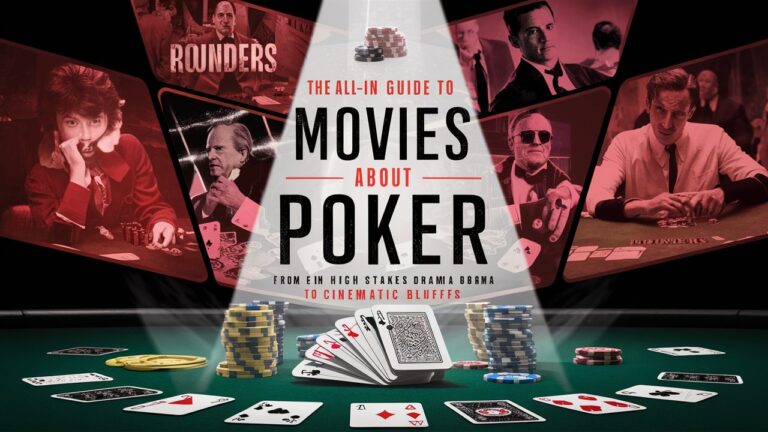Introduction
Poker has long captivated audiences with its blend of strategy, psychology, and high-stakes tension, making it a natural fit for cinematic storytelling. From smoky backroom games to glitzy casino showdowns, movies about poker explore themes of risk, redemption, and the thin line between luck and skill. This article dives into the world of poker films, examining iconic titles, hidden gems, and the cultural impact of these stories. Whether you’re a card shark or a casual viewer, this guide unpacks why poker movies remain a winning hand in Hollywood.
1. The Rise of Poker in Cinema: A Historical Perspective
The relationship between poker and cinema dates back to the early 20th century, when Westerns like Arizona Bound (1927) depicted saloon poker games as symbols of frontier morality. Over time, poker evolved from a narrative backdrop to a central plot device. The 1960s and 1970s saw films like The Cincinnati Kid (1965) elevate poker to a psychological battleground, mirroring societal tensions. This era cemented poker as a metaphor for life’s unpredictability, blending character-driven drama with the game’s inherent suspense.
Modern poker movies often draw from real-life tournaments like the World Series of Poker, reflecting the game’s mainstream popularity. Titles like Rounders (1998) and Molly’s Game (2017) showcase how poker’s allure lies not just in the cards, but in the human stories of ambition, addiction, and resilience.
2. Iconic Poker Films: Breaking Down the Classics
Certain poker movies have become cultural touchstones. Rounders, starring Matt Damon and Edward Norton, is revered for its gritty portrayal of underground poker circuits. Its authentic dialogue (“In the poker game of life, women are the rake”) and technical accuracy (thanks to advisor Brian Koppelman) made it a cult classic. Similarly, The Cincinnati Kid pits Steve McQueen against a veteran gambler in a high-stakes stud poker match, exploring themes of generational rivalry and hubris.
Then there’s California Split (1974), a Robert Altman-directed gem that contrasts the thrill of winning with the emptiness of compulsive gambling. These films transcend the game itself, using poker as a lens to examine human nature.
3. High-Stakes Drama: Poker as a Narrative Catalyst
In many films, poker isn’t just a game—it’s a life-or-death metaphor. Casino Royale (2006) reimagined James Bond as a strategic thinker, with a pivotal poker scene replacing the novel’s baccarat showdown. The tension between Bond and Le Chiffre isn’t just about money; it’s a battle of wits that defines the entire plot. Similarly, Molly’s Game (2017) uses poker to explore power dynamics and ethical ambiguity, as Molly Bloom’s underground games attract celebrities, mobsters, and FBI scrutiny.
These films thrive on psychological depth, showing how poker mirrors larger conflicts—trust, betrayal, and the cost of ambition.
4. Comedies and Satires: Laughing at the Poker Table
Not all poker movies take themselves seriously. Comedies like The Grand (2007), an improvisational mockumentary about a chaotic poker tournament, highlight the absurdity of competitive gaming. Similarly, Mississippi Grind (2015) blends humor and pathos as two down-on-their-luck gamblers road-trip through the South. These films use poker’s unpredictability to fuel comedic mishaps while subtly critiquing the myth of the “easy win.”
Even A Big Hand for the Little Lady (1966), a Western comedy, turns a high-stakes game into a farcical lesson in teamwork and deception.
5. The Psychology of Poker in Film: Minds Over Cards
The best poker movies delve into the mental warfare behind the game. The Sting (1973) uses poker as part of an elaborate con, emphasizing manipulation over actual gameplay. Croupier (1998) explores the psychological toll of gambling through a writer-turned-dealer who becomes obsessed with his players’ motives. These films dissect the “poker face” trope, revealing how characters use bluffs and tells to mask vulnerability or assert dominance.
Poker’s structure—controlled chaos with rules—allows filmmakers to externalize internal struggles, making it a rich tool for character development.
6. Documentaries and Biopics: Real-Life Poker Stories
Beyond fiction, documentaries like All In: The Poker Movie (2009) chronicle the game’s rise from underground pastime to televised phenomenon. The film interviews legends like Phil Hellmuth and Chris Moneymaker, whose 2003 World Series of Poker win sparked a global card craze. Biopics like Lucky You (2007), though fictionalized, reflect real-world tensions between professional gamblers and personal relationships.
These works highlight poker’s duality: a game of skill celebrated as sport, yet shadowed by addiction and financial ruin.
Conclusion
Movies about poker endure because they tap into universal themes—risk, reward, and the quest for control in an unpredictable world. Whether through adrenaline-pumped drama or dark comedy, these films reveal as much about human nature as they do about the game itself. Next time you watch a poker movie, pay attention not just to the hands dealt, but to the stories unfolding around the table. After all, in poker and cinema alike, it’s the players—not the cards—that make the game unforgettable.
Frequently Asked Questions (FAQs)
Q1: What’s the best poker movie for beginners?
Rounders is often recommended for its balance of entertainment and authentic poker strategy. It’s accessible yet rich in detail.
Q2: Are poker scenes in movies realistic?
Some films prioritize drama over accuracy, but Molly’s Game and Rounders are praised for their technical realism, thanks to poker consultants.
Q3: Are there documentaries about professional poker players?
Yes! All In: The Poker Movie and Bet Raise Fold (2013) explore the lives of pros and poker’s online boom.
Q4: Do poker movies glamorize gambling?
While some romanticize the lifestyle, many (California Split, Mississippi Grind) critique the consequences of addiction.
Q5: Why is poker such a popular theme in films?
Poker’s mix of strategy, luck, and human psychology provides a ready-made framework for conflict, character growth, and suspense.
Let me know if you’d like to expand on any section! 🎬♠️
